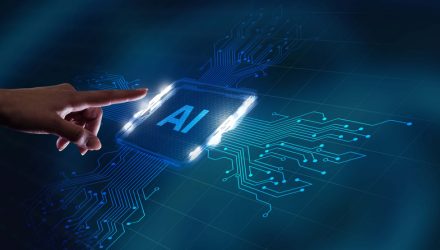It’s been an up-and-down year for tech investing, with the Fed’s interest rate hikes corralling some of the easy money which helped companies of all cap sizes expand over the last several years. For investors still on the lookout for long-term, disruptive innovation, they may want to consider what Wright’s Law means for the cost of computer chips via an AI ETF like the ARK Autonomous Technology & Robotics ETF (ARKQ).
Wright’s Law, named for Theodore Wright’s work in 1936, offers a framework for cost declines tied to productivity, with each cumulative doubling of units dropping costs by a constant percentage. In the past, that’s applied to other innovations that have fundamentally changed our world, like airplanes and transistors.
Wright’s Law also applies to the increasing use of AI accelerators at data centers instead of CPUs. The accelerators offer data centers the ability to specialize their processing for specific uses via neural network training, with Wright’s Law suggesting that the performance equivalent of an Nvidia Corp. (NVDA) K80 chip will have dropped from $11,000 in 2014 to just 5 cents in 2030.
That positions industries aiming to leverage robotics and autonomous technology for serious growth, with demand for the hardware behind AI to reach $1.7 trillion in revenue by 2030. Investors looking for exposure to this trend should consider whether an AI ETF like ARKQ makes sense in their portfolios.
The actively-managed ARKQ charges a 75 basis point fee and invests in firms set to benefit from advancements in AI as well as automation, materials, and manufacturing. ARKQ holds Tesla (TSLA) as its largest stock weighted at 9.5%, followed by Trimble Inc. (TRMB) at 8.9%, and autonomous tractor developers Deere & Company (DE) at 6.9%.
ARKQ has seen its performance increase by 11% from its three-month returns to its one-month returns, with its flows also increasing on net by $13 million when comparing its one-month net flows to its five-day net flows.
A lot remains to be seen entering 2023, with markets still asking where the Fed sees its terminal rate and whether a recession really is looming. Investors looking for exposure to disruptive innovations in whichever case may want to consider how the hardware behind AI may become more affordable moving forward and how to invest in firms that might benefit from that change in an AI ETF like ARKQ.
For more news, information, and analysis, visit the Disruptive Technology Channel / VettaFi | ETF Trends.

